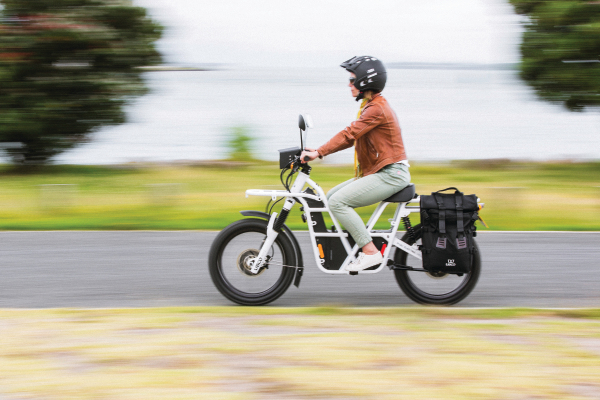Ubco, the New Zealand-based electrical utility bike startup, has raised $10 million to fund a world growth centered on the U.S. market and scale up its business subscription service enterprise.
Ubco’s hero product, the Ubco 2X2, is an all-wheel drive electrical motorcycle that appears like a mud bike however rides like a moped. What started as an answer for farmers to get round pastures and farms simply, safely and rapidly has expanded to incorporate an city model of the bike that caters to fleet enterprise clients, gig economic system staff and metropolis riders.
Since its founding in 2015, the corporate has produced two variations of its 145-pound utility bike: The Work Bike, the unique off-road car, and the Journey Bike, the newer model that’s made for metropolis using however can deal with itself off-road.
Now that Ubco’s obtained a contemporary money infusion from the spherical led by Seven Peak Ventures, Nuance Capital and TPK Holdings, it hopes to proceed increasing into current verticals, like meals supply, postal service and last-mile logistics. The corporate already works with Domino’s in New Zealand and the UK, in addition to a variety of different nationwide shoppers, just like the New Zealand Submit, the Protection Drive, the Division of Conservation and Pāmu, or Landcorp Farming Restricted and different native eating places and shops.
“We have now a robust enterprise market in New Zealand and have developed a robust pipeline of gross sales internationally,” Timothy Allan, CEO and co-founder, instructed TechCrunch.
Whereas direct client gross sales make up for many of Ubco’s income at current, the corporate is pushing aggressively into enterprise, and extra particularly, subscription providers. The 2X2 is constructed on an clever platform that features car and energy techniques, cloud connectivity and knowledge evaluation, which permits the subscription mannequin to work alongside fleet administration techniques.
Ubco expects income to climb from $2.1 million in 2020 to $8.4 million by the top of 2023 because it pushes to extend its annual recurring income by subscriptions. Ubco’s subscription mannequin, which prices about $50 to $60 per week ($75 to $85 NZD) for fleet enterprise clients, is being rolled out in New Zealand, Australia, the U.Okay., Europe and the U.S. this yr and into 202. Shoppers will get entry to the subscriptions, as properly, throughout the subsequent couple of months, in accordance with a spokesperson for the corporate.
Allan sees subscriptions as the way forward for the EV trade, not simply because it permits for a excessive likelihood of profitability, but additionally as a result of it’s way more environmentally sustainable. As the corporate expands this a part of its enterprise mannequin, it hopes to guide the round economic system area.
The corporate predicts that automobiles run by the subscription mannequin may have 4 instances the life expectancy as these bought outright and produce 80% much less carbon general in comparison with a combustion car.
“Subscription means we personal the car, so we handle the lifecycle,” stated Allan. “So the primary life begins at excessive depth, and that could be 60,000 kilometers delivering pizza, or it could be 30,000 kilometers on a farm, that are equally laborious for various causes. Then after, that car will go right down to a decrease depth software. After that the battery can then be pulled out, and which may go into passive photo voltaic storage or one thing like that.”
Allan sees fixing the end-of-life concern as a private {and professional} problem, one with room for creativity since nobody has absolutely discovered the right means of doing it. He says he takes a bottom-up strategy with regards to the engineering of the car in a means that permits for simpler recycling.
“Like whenever you design a battery, fuck placing hearth retardant foam into it as a result of you possibly can’t get it again on the finish of life,” he stated. “So it begins with accurately labeling, engineering with intent so that you simply’re designing for one of these meeting, after which your enterprise or business system must assist the idea. Now, we’ve obtained the benefit as a result of the economics and incentives are aligned, and that every one aligns with New Zealand’s product stewardship laws.”
Making an attempt to good the round economic system by utility automobiles isn’t nearly doing what’s proper for the atmosphere. Allan thinks it’ll be a wise enterprise resolution in the long run, one that can attract clients and provides the corporate a aggressive edge with enterprise shoppers.
“This is part of your journey with us as a buyer,” stated Allan. “If we are able to design subscriptions and the lifetime of the car in such a means that you simply be ok with it, that’s the place we’re driving from. Most individuals need to do the appropriate factor, and we are able to present one thing that logically suits the economics, could be carried out at scale and could be managed holistically.”







